Ginger – the natural wonder
The knobbly many fingered rhizome of ginger is considered a natural wonder as it has numerous time tested benefits.The rhizome which is actually the root of the ginger plant has been prized for centuries for its aromatic, culinary and medicinal properties. Ginger (Inguru in Sinhala and Ingi in Tamil), Zingiberofficinale in the family Zingiberaceae is the world’s most widely cultivated spice.
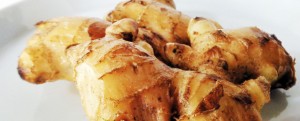
An aphrodisiac too: Ginger has also been considered as an aphrodisiac as the pungent smell and taste warms your insides, increases blood flow and arouses the olfactory glands.
In Sri Lanka three main varieties of ginger are grown on a large scale all over the country with Kurunegala, Kandy, Gampaha, Colombo and Kegalle being the main growing areas. The rhizomes of the local ginger variety are small and the fibrous flesh is somewhat ash white, with the taste and aroma being comparatively higher than other species. The Chinese variety has larger rhizomes with a watery pale yellow flesh with a lower taste and aroma. The Rangoon ginger rhizomes are medium in size with well spread fingers. All the rhizomes have occasional rings, a light to dark tan skin and are available all year round.
Buying and storing
If you are buying fresh ginger look for plump roots without blemishes. Avoid the very knobbly ones, as they’ll be harder to peel. If you do not need a large piece just break off what you require, it should break easily, if it is not over mature and fibrous or not very fresh. Store unpeeled ginger in the refrigerator in a paper or re-sealable bag with all the air pressed out. It should last for about 2 weeks. Ginger can also be frozen for 1 to 2 months.
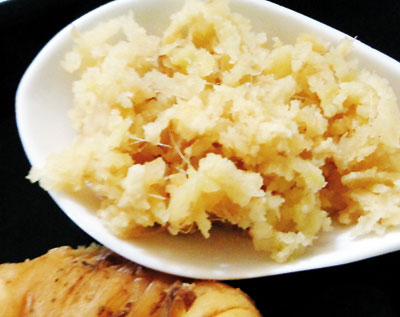
Raw ginger
Culinary and other uses
Ginger is used in curries, stir fries, dressings, marinades, stocks, purees and confectionery as well as in drinks such as ginger beer, ginger ale, tea, smoothies and juices. Ginger can be dried, crystalized, candied or pickled for preservation. Dried ginger powder works well in ginger bread, cakes, biscuits and masala mixtures. Ginger preserve is indispensable for Christmas cake and pudding. Ginger oils and oleoresins are used commercially to make ginger beer, ale, bakery and other food products and to some extent in the perfumery industry.Ginger is also a common ingredient in the ayurvedic medical system. Interestingly, e-cigarettes often employ ginger to spice up the liquid.
Ginger components
The ginger root contains a very complex mixture of over 100 different chemical components. However, its distinctive taste, flavour and characteristic pharmacological effects are provided by a variety of chemicals called gingerols with 6-gingerol being the major pungent compound. Cooking ginger converts gingerol into zingerone, which is less pungent and has a spicy-sweet aroma. When ginger is dried gingerol changes to shogaols, which are about twofold as pungent as gingerol. This is why dried ginger is more pungent than fresh ginger.
Best ways to use ginger
Raw ginger – Sliced, chopped, grated or crushed, raw ginger is usually used in curries, stir-fries, dressings and marinades.
Ginger tea – Steep fresh sliced ginger in hot water or boil sliced or grated ginger until pale yellow in colour. Add some honey, lemon or cinnamon to enhance the taste.
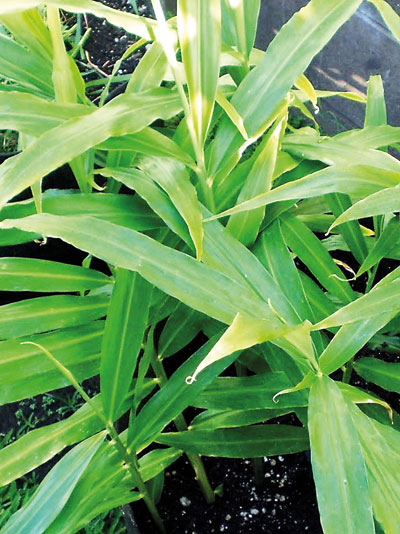
Grow your own: You can easily grow ginger in a pot or in the ground, in a not too sunny place. Choose roots with visible eyes at the end of the fingers, plant in loose soil. Water lightly but regularly. You can harvest what you need 3 to 4 months after planting and let the rest grow.
Ginger essential oil — Is the most potent form of ginger because it contains the highest level of gingerol. This is the best way that ginger can be used as medicine. Ginger powder –To make ginger powder, clean the root well, and cut into small pieces, dry in the sun or in the oven. When completely dry, powder finely in a dry blender, sieve and store in an airtight container.
How much ginger?
Ginger is so concentrated with active ingredients that you only need little to enjoy its benefits.
Health benefits
- Settles stomach Issues
Eat a few slices of ginger sprinkled with salt before meals to help digestion and prevent stomach issues. Drink ginger tea after a large meal to reduce bloating and flatulence.
- Therapy for nausea
Chew ginger pieces, or drink ginger tea with 1-2 inches of fresh ginger in hot water to relieve nausea. Ginger is also good at reducing morning sickness in pregnant women, motion sickness in travellers, and even nausea in chemotherapy patients.
- Relieves pain
Gingerol is a very potent anti-inflammatory compound, so take ginger at the onset of a migraine attack to stifle the symptoms. Studies have also shown that those with osteoarthritis and rheumatoid arthritis experienced less pain and swelling when they took powdered ginger daily in food or tea. Further, ginger can reduce inflammation and muscle pains caused by exercise as well as reduce pain associated with menstruation.
- Heals the heart
Studies have suggested that the compounds in ginger go to work by lowering cholesterol, regulating blood pressure, improving blood flow, and preventing blocked arteries and blood clots – all of which help reduce the risk of heart attacks and strokes.
- Relieves respiratory disorders
Ginger compounds have shown positive results in treating respiratory disorders, and it is a promising treatment for patients suffering from asthma. Part of the reason ginger works is due to its potent antioxidant, anti-inflammatory and pain relieving compounds.
- Boosts Immunity
Ginger is a wonderful immune system booster, making it a well-known treatment for colds and flu. And since it helps calm symptoms of upper respiratory tract infection, it also works on coughs, sore throats and bronchitis.
- May help prevent certain cancers
A number of studies point to the cancer fighting properties of ginger that suggest the potential as a preventive measure for ovarian, prostate and colon cancers.
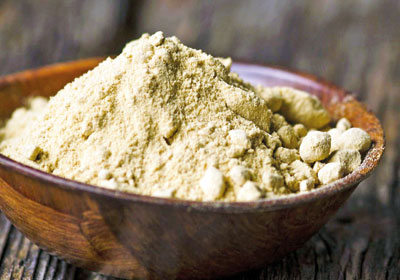
Health risks: Blood clotting Avoid ginger if you have bleeding disorders and while on medications that slow bleeding as it may inhibit clotting. Low blood sugar Ginger may lower blood sugar levels so monitor your sugar carefully if you use ginger regularly. Pregnancy Some studies have raised concerns of consuming too much ginger during pregnancy. However other studies have indicated that ginger is safe to take for morning sickness if taken for no longer than 3 to 4 days. Mouth and mucous membranes As ginger is considered a warming substance, do not use ginger if it causes any inflammation of mouth and mucous membranes. So ginger can be generally safe for most people, but avoid or use in moderation if you have any risks associated with ginger.
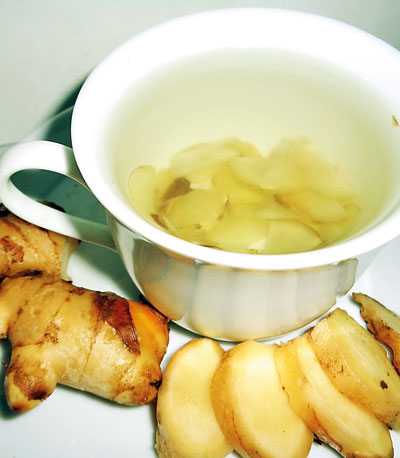
Quick tip: Ginger tea is great to drink when you feel a cold coming on. It is a diaphoretic tea, meaning that it will warm you from the inside and promote perspiration. It is also good when you just want to warm up. Ginger tea is a natural home remedy that gives relief from nausea, indigestion, sore throats, cold and flu.


